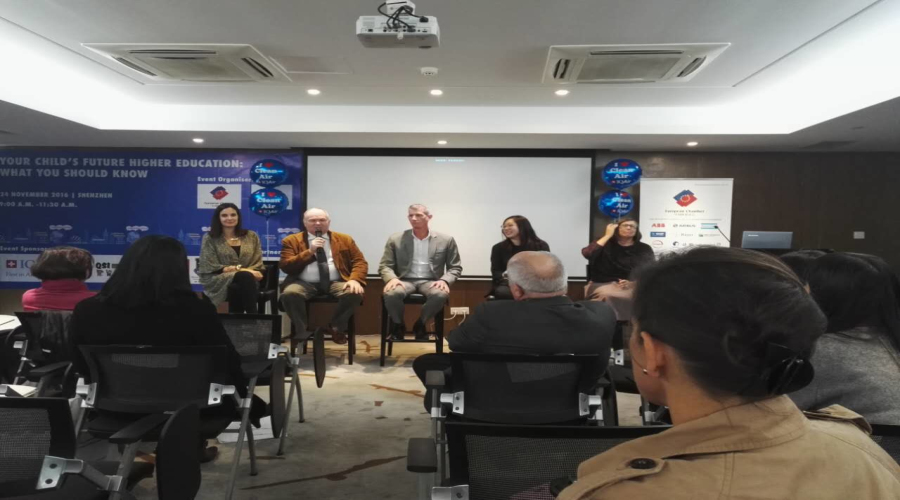Chen Xiaochun
654789759@qq.com

A FORUM on higher education themed “Your Child’s Future Education: What You Should Know,” organized by the European Chamber and China Merchants Shekou Holdings, was held in the Net Valley Club in Shekou on Thursday.
The forum covered topics such as university admissions for expats and international students, skills and qualities needed for university, choice of country and educational institutes for study, 21st century skills that companies would like to see from international graduates and the concept of a “Third Culture Kid (TCK).”
“Private colleges tend to be much smaller than public universities and may have only a few thousand students. Public universities and colleges can be big, and some are huge,” said Scott D’Alterio, a board member of the European Chamber South China and director of QSI International School of Shenzhen, as he explained some U.S. university lingo to the around 80 parents present.
Michael Clancy, a high school counselor at Shekou International School, introduced the situation of studying in Europe by telling the forum that the cost for European education tends to be lower than in the U.S., although the U.S. is more generous in terms of scholarship.
The concept of a “Third Culture Kid,” which was new to many parents, was touched on at the forum.
According to U.S. writer Ruth Van Reken, a third culture kid is a person who has spent a significant part of his or her developmental years outside of their parents’ culture. A third culture kid builds relationships with many cultures, assimilating elements from each into his or her life experience, but never has full ownership of any.
“The number of expats in the world has grown from 73 million in 1960 to 230 million in 2013, which has linguistic implications and educational implications, as well as cultural implications,” said Lisa Sedlacek, intensive English coordinator at QSI Shenzhen.
Sedlacek told the forum that TCKs tend to be more successful than average kids in terms of academic and career achievements, and also in humanitarian aspects, such as family and community commitment.
Joanna Skoczek, consul general of Poland in Guangzhou, said that currently there are about 400 universities in Poland, 134 of which are public. In total, over 700 courses are taught in English.
“In our system, public means they belong to the state system of education. Private is private. Now we have over 50,000 foreign students studying in Poland,” said Skoczek.
Right after President Xi Jinping’s state visit to Poland in June this year, an agreement was signed at the governmental level regarding the mutual recognition of diplomas between the two countries, which started in September.
“So if you have taken the exam of Gaokao or finished Zhuanke (college), you are entitled to apply for studies at Polish universities,” Skoczek said.
Editor Lily A